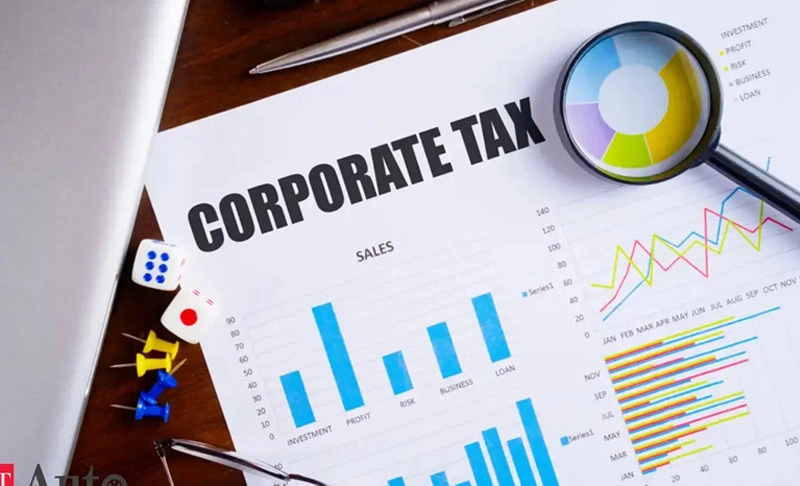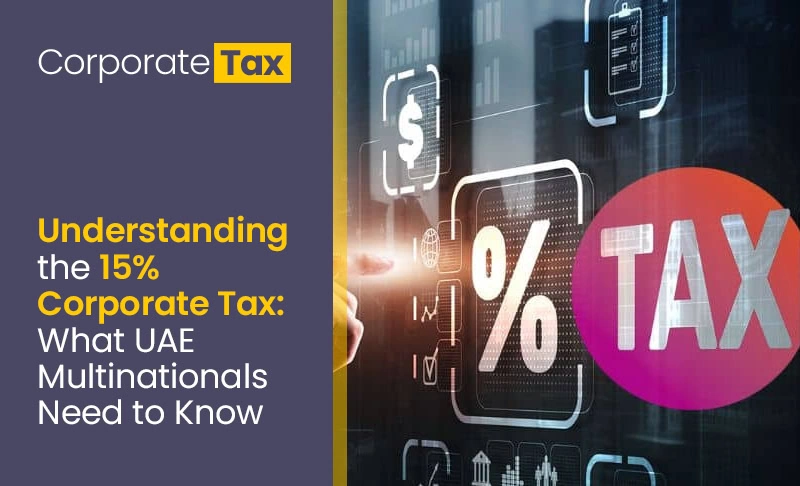The UAE’s corporate tax panorama is presently undergoing a significant transformation, in particular with the introduction of a 15% Domestic Minimum Top-Up Tax (DMTT) in 2025. This shift marks a pivotal change in corporate tax Dubai for groups operating in Dubai and throughout the UAE, aligning the US international tax requirements and impacting multinational firms (MNEs) in particular. This article will discuss the in-depth examination of Dubai corporate tax structure, the role of corporate tax experts, and the implications for free-zones.

Corporate Tax in Dubai: A New Era For Businesses
Historically, the UAE has been called a tax-friendly jurisdiction with a 0% corporate tax environment, attracting international buyers and entrepreneurs. However, beginning June 1, 2023, the UAE brought a federal corporate tax at a rate of 9% on business income exceeding AED 375,000, aiming to diversify authorities” sales and beautify financial transparency.
The corporate tax structure is tiered as follows:
- 0% tax: For taxable earnings as much as AED 375,000, ideal for small businesses and startups.
- 9% tax: For taxable earnings above AED 375,000.
- 15% tax: For large multinational firms under brand-new Domestic Minimum Top-Up Tax beginning January 1, 2025.
This tiered approach supports the UAE’s dedication to fostering entrepreneurship at the same time as aligning with global tax frameworks.
The 15% Domestic Minimum Top-Up Tax (DMTT) and Its Impact
From January 1, 2025, the UAE will put in force the DMTT, focused on huge multinational firms with consolidated international sales exceeding €750 million (about AED three billion). This tax aims to ensure these MNEs entities pay a minimal effective tax rate of 15% on income earned within UAE, remaining gaps that permit income moving to low-tax jurisdictions.
The move is a part of the OECD’s Pillar Two international tax framework, designed to save you from base erosion and income moving, thereby selling tax equity and transparency globally. Without the DMTT, other jurisdictions could impose their own taxes on income earned in the UAE, potentially lowering Dubai’s attraction as a business hub.
Who is Affected?
- Large multinational firms with sizable international revenue thresholds.
- Free region companies that can be a part of a bigger MNE organization can also be subjected to the 15% tax if the organization’s effectivetax rate within UAE falls under the threshold.
- SMEs and smaller organizations stay in large part exempt from the 15% tax, retaining Dubai’s appeal for startups and small businesses
Corporate Tax in Dubai Free Zones
Dubai’s free zones offer significant business advantages, including a 0% corporate tax rate, 100% foreign ownership, and customs exemptions. Qualifying Freezone persons (QFZPs) can maintain the 0% tax rate if they meet specific criteria. However, free zone entities conducting business with mainland UAE must pay corporate tax on those sales. These entities must also register for corporate tax and file returns, even if no tax is owed, to ensure compliance. The introduction of the DMTT may subject some free zone organizations, particularly those linked to large multinationals, to a 15% tax if their effective tax rate falls below a certain threshold.
The Role of a Corporate Tax Consultant in Dubai
Navigating Dubai’s changing corporate tax landscape requires professional guidance. Corporate tax experts help businesses understand new tax laws, assess liabilities under the 9% and 15% tax regimes, optimize tax systems for available exemptions and incentives, and ensure timely registration and submissions to avoid penalties. Engaging a qualified tax representative is essential for compliance and effective tax strategy, especially for multinational companies.
Dubai corporate tax: Mainland vs Free Zone
| Aspect | Mainland Companies | Free Zone Companies (Qualifying) | Multinational Enterprises (MNEs) |
| Corporate Tax Rate | 9% on profits above AED 375,000 | 0% if substance/activity criteria met | 15% Domestic Minimum Top-Up Tax if global revenue > €750M |
| Tax Exemptions | SMEs under AED 375,000 exempt | Tax-free periods up to 50 years possible | None for qualifying MNEs |
| Registration & Filing | Mandatory | Mandatory, even if no tax payable | Mandatory and complex reporting requirements |
| Impact of DMTT | Applies to large companies | Applies if part of MNE group with low effective tax rate | Applies to all qualifying MNEs |
This evaluation highlights the nuanced tax duties relying on corporation kind and size, emphasizing the want for tailor-made tax advice.1699.
Preparing for the New Corporate Tax Environment
Businesses operating in Dubai must take proactive steps to conform to the brand-new corporate tax regime:
- Register for Corporate Tax: The Federal Tax Authority (FTA) calls for groups exceeding thresholds to register by March 31, 2025.
- Understand Tax Obligations: Companies should familiarize themselves with submission deadlines, accounting intervals, and documentation requirements.
- Engage Corporate Tax Consultants: A corporate tax consultant in dubai is essential for compliance, tax-making plans, and leveraging incentives.
- Review Business Structures: Multinational organizations must investigate their international operations to ensure compliance with the 15% tax and avoid double taxation.
Conclusion
The introduction of a 15% Domestic Minimum Top-Up Tax in Dubai signifies a significant shift in the UAE’s corporate tax landscape, aligning it with global standards while remaining competitive. While SMEs and companies in Dubai’s free zones will continue to enjoy favorable tax conditions, large multinational firms must prepare for pre-deduction tax obligations starting in 2025. Engaging a corporate tax representative in Dubai is essential for effectively navigating these changes, ensuring compliance, and optimizing tax strategies. Understanding the specifics of Dubai’s corporate tax, especially regarding free zones and multinational operations, is crucial for success in this new tax era in the UAE.
FAQs
Who is subject to the 15% corporate tax in the UAE?
Large multinational enterprises (MNEs) with global revenues exceeding €750 million are subject to the 15% Domestic Minimum Top-Up Tax starting January 1, 2025.
Does the 15% tax apply to free zone companies in Dubai?
Yes, if a free zone company is part of an MNE group and its effective tax rate in the UAE is below 15%.
Are small businesses and startups affected by the 15% tax?
No, SMEs with revenues below the threshold remain subject to 0% or 9% corporate tax, not the 15% DMTT.
Why is the 15% tax being implemented in the UAE?
It aligns the UAE with OECD global tax rules and ensures large MNEs pay a fair minimum tax locally.




